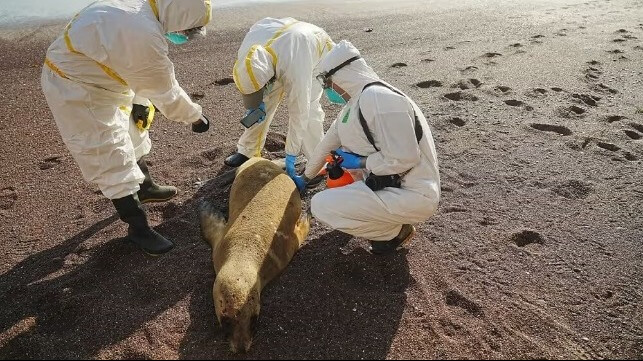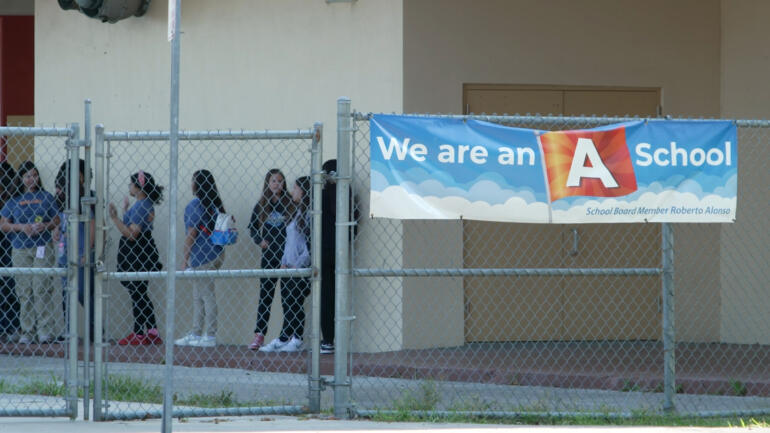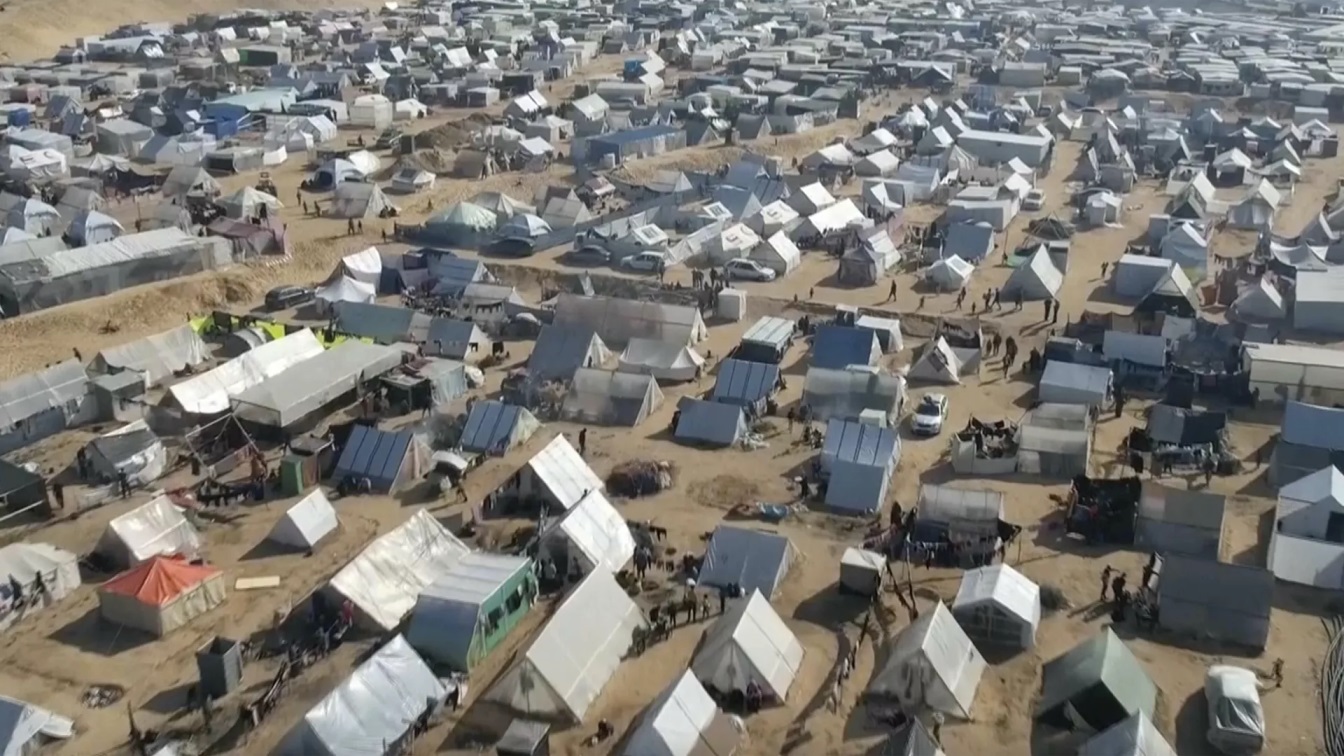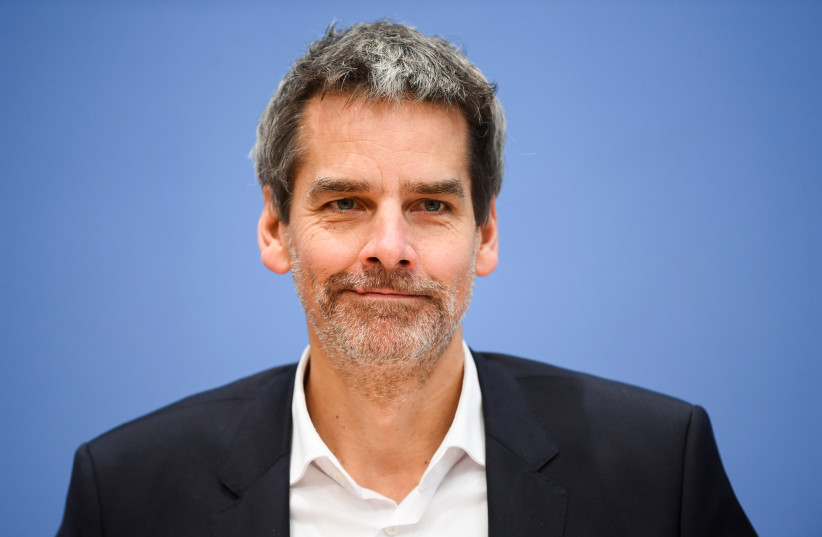[By Fermín Koop]
A deadly strain of avian influenza is spreading across the global ocean. Scientists estimate that it has caused the death of tens of millions of poultry and wild birds around the world. Officially called A(H5N1) clade 2.3.4.4b, it has also been detected in at least 48 mammal species and is strongly implicated in mass die-offs of sea lions and seals.
Bird flu was previously considered primarily a threat to poultry and secondarily a potential human pathogen. But it has now become a terrifying, albeit still largely unquantified, threat to marine life too.
Where is it?
The current troubling form of the virus was first detected in Europe in autumn 2020. At the end of 2021, it was discovered in North America and has since been recorded in wild birds in every US state.
The virus then went south and by December 2022 had reached the southern tip of South America. It has now been detected in Antarctica, as well as Africa and Asia. Only the Pacific Islands, Australia and New Zealand remain free of it.
How is it affecting ocean wildlife?
Populations of wild birds have been hit hard across the globe. At least 100,000 from 24 species had died in Peru’s protected areas after contacting the virus between November 2022 and mid-March 2023, a study found.
Various mammals have been infected by previous strains of H5N1, mainly dogs and cats and some animals classed as ‘semiaquatic’ such as mink. But the current strain has spread to significantly more species and been reported in 13 marine mammals, according to a March study.
Mass deaths have occurred. In Argentina, over 17,000 southern elephant seal pups were found dead on the Valdés Peninsula in a die-off attributed to the virus. There have been at least 24,000 sea lion deaths linked to it recorded in Peru, Chile, Argentina, Uruguay and Brazil.
Víctor Gamarra-Toledo is an author of the March study, and a researcher at the Natural History Museum of Peru’s San Agustín de Arequipa National University. He says the large number of deaths is undermining ecosystem services provided by the animals affected. So many birds have perished in Peru it is lowering the production of seabird excrement that farmers use as fertiliser, he told Dialogue Earth.
How bad could it get?
The virus is already exacerbating the predicament of several species of conservation concern. As well as sea lions and elephant seals, this includes marine otters and dolphins.
“It’s a real blow to some species and they will take a long time to recover. The bird flu also reached the Galapagos”, says Claire Smith, UK policy lead on avian influenza at the Royal Society for the Protection of Birds. Of the 56 native Galapagos bird species, 45 are endemic, meaning found only there.
Impacts on wild marine birds have varied widely. In the UK, there has been a 70% reduction of northern gannets at their key breeding ground of Bass Rock. But, on the other side of the world in Antarctica, Adélie penguins tested positive without showing any ill effects.
The true impact of the outbreak is hard to quantify.
“Any number of deaths is an underestimate. Birds and mammals can die in areas where there’s no surveillance and we don’t find out. We also don’t have much numbers from what’s happening in Africa. Millions of birds have died and the impact on populations is significant,” says Christian Walzer, executive director of health at the Wildlife Conservation Society.
How did this problem start?
Bird flu is nothing new in the poultry industry. These viruses are categorised as either low or highly pathogenic depending on their lethality to poultry. Highly pathogenic H5N1 was first detected in farmed geese in Guangdong, China, in 1996, and quickly spread through populations of captive, commercial birds.
What sets the most recent strain apart is the rapidity with which it spreads and the severity of the disease it causes among wild birds and mammals, experts told Dialogue Earth.
“It used to be present mostly in winter, with peaks of infection, and then a big drop. Now the infection is present all year round, generating many risks and more chances of transmission,” says Marcela Uhart, director of the Latin America program at the Karen C. Drayer Wildlife Health Center, University of California, Davis.
How is it spreading?
In birds, avian influenza primarily spreads through contact with the saliva, nasal secretions, or droppings of infected birds. Once it becomes prevalent among wild populations, it can spread globally as birds migrate, including to marine areas far from farms.
Scientists are not yet sure how it passes between birds and mammals. Many infected species are scavengers, suggesting that eating infected corpses could be involved. Healthy animals may also get the virus from contact with faeces from infected members of their own kind. Species that seem to be resistant to severe illness could still be spreading the virus.
In a study published in February, scientists report collecting brain samples from sea lions, one fur seal and a tern found dead on the shores of Argentina. They all tested positive for H5N1 and genome sequencing revealed that the virus was almost identical in each, with mutations that assisted spread in marine mammals.
Are humans at risk?
Humans can be infected with H5N1, but it is relatively rare and the risk to the public has been widely regarded as low. Most infections have been among those, such as poultry workers, who have had close contact with infected birds. A total of 20 countries have reported 882 cases of bird flu in humans since 2003, half of which were fatal, according to the US Centers for Disease Control and Prevention.
Experts advise avoiding close contact with sick or injured birds and mammals.
“If the virus can be transmitted between marine mammals, as it’s now believed, that’s a big problem for us [humans],” says Pablo Plaza, an Argentine veterinarian working at the Centro Científico Tecnológico Patagonia Norte. “The virus is here to stay, and while things seem to be calmer now, it can keep on surprising us.”
What can be done?
Detecting bird flu early is the primary line of defence, according to the World Organization for Animal Health (WOAH). Early detection and timely reporting of infected birds lets countries know which flu subtypes are in circulation. They can then limit the movements of poultry and monitor wildlife.
While there is a vaccine being used on poultry, WOAH says it must be part of a wider disease-control strategy. Culling is one of the recommendations, along with quarantining.
“It’s something we have control over, live poultry travels very long distances,” says Diana Bell, a UK conservation biologist based at the University of East Anglia. Bell suggests making farms self sufficient in rearing eggs and chicks, instead of exporting them internationally. She also advocates stopping the trend towards megafarms that contain over a million birds.
Researchers are trialling a vaccine for endangered condors in the US, but implementing this on a large scale in other wild birds would be difficult. “We can’t vaccinate wildlife; it would never end. It’s preferable for the virus to hit a population and for it to develop natural immunity,” says the Wildlife Conservation Society’s Walzer.
On 26 June 2023, veterinarian Mariana Cadena and zookeeper Fernanda Short collect blood from a brown booby suspected of having bird flu. They work in Rio de Janeiro, Brazil, at the Santa Ursula University Marine Animal Rehabilitation Centre. (Image: Bruna Prado, AP via Alamy)
What happens next?
The spread of the virus is overlapping with environmental changes due to climate change, and the latter could increase the problem of the former. In Chile, for example, the El Niño weather phenomenon had a strong impact last year on fish that birds rely on for food, placing more stress on animals and likely making them more susceptible to the virus.
Vivian Fu, Asian Flyways Initative lead at WWF-Hong Kong, says the ongoing bird flu disaster highlights the importance of a One Health approach. This involves looking at the close connection between the health of people, other animals and our shared environment.
For now, ocean researchers face a nervous wait to see where the virus appears next, how badly it harms the animals it infects, and how that reshapes our understanding of the threats to marine life.
“Over 40% of the Peruvian pelicans died because of the virus,” Uhart says. “A country might have a conservation strategy with marine protected areas and think that is sufficient to mitigate impacts to a species, but the virus brings a new layer of complexity.
“We might think a bird or a marine mammal is doing well based on their conservation status and the number of individuals out there. But then something like this happens and it changes everything.”
Fermín Koop is the Latin America managing editor at Dialogue Earth. Based in Buenos Aires, Argentina, he started working with the organisation in 2014 as a freelancer before transitioning to an editorial role. He is also a trainer and mentor for the Earth Journalism Network (EJN) and a teacher at the Argentine University of Enterprise (UADE).
The opinions expressed herein are the author's and not necessarily those of The Maritime Executive.











